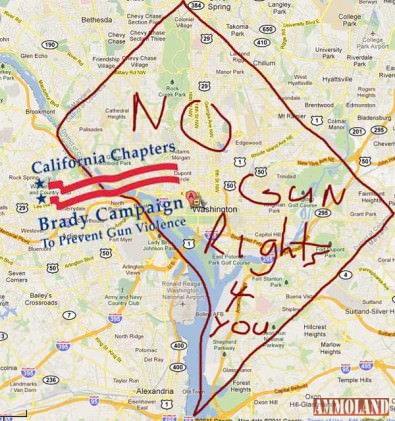Appeals Court Rules Against D.C. Gun Owners in Heller II


FAIRFAX, Va. –-(Ammoland.com)- In a split ruling in an ongoing NRA-supported case challenging the restrictive gun laws established by the Washington D.C. government in defiance of the Supreme Court’s 2008 Heller decision, the U.S. Court of Appeals for the District of Columbia Circuit has upheld a number of highly restrictive gun laws.
Unfortunately, the court ruled that the District’s general handgun registration requirement is constitutional. However, the court reached that conclusion by misreading the Supreme Court’s Heller decision as presuming that any type of “longstanding” restriction is constitutional, so it only upheld the more traditional aspects of the registration system, such as the requirements that the registrant provide his or her name and address, a description of the firearm and certain other basic information.
By contrast, the court found that other D.C. requirements, such as fingerprints, a vision requirement, ballistics tests and mandatory training, were “novel” and therefore need to be reviewed again by a lower court under a tighter standard of scrutiny. Similarly, the court found that long gun registration is “novel” in the U.S. and returned that issue to the lower court as well.
D.C. laws banning “assault weapons” and magazines that hold more than 10 rounds of ammunition were also wrongly found to be constitutional. The Supreme Court said in Heller that “arms” are protected under the Constitution if they are “in common use,” and the D.C. Circuit found it “clear enough in the record that semi-automatic rifles and magazines holding more than ten rounds are indeed in ‘common use,'” based on Bureau of Alcohol, Tobacco, Firearms and Explosives production statistics showing that “1.6 million AR-15s alone have been manufactured since 1986,” and that the banned magazines are even more prevalent.
But the court also found — based largely on the testimony of a Brady Campaign lawyer to the District of Columbia Council — that “the District ha[d] carried its burden of showing a substantial relationship between the prohibition of both semi-automatic rifles and magazines holding more than ten rounds and the objectives of protecting police officers and controlling crime.”
Fortunately, in a long and well reasoned dissenting opinion that may provide a road map for other courts, Judge Brett Kavanaugh rejected the majority’s reasoning. Rather than the “intermediate scrutiny” employed by the majority or any other “balancing test,” Judge Kavanaugh would have applied a standard based on “text, history, and tradition.” Under that standard, he argued that “it would strain logic and common sense to conclude that the Second Amendment protects semi-automatic handguns but does not protect semi-automatic rifles,” which “have not traditionally been banned and are in common use today.”
Judge Kavanaugh also would have rejected the entire registration system, arguing that D.C.’s type of total gun registration system is not “traditional” and “remains highly unusual today.”
The NRA strongly disagrees with the outcome, and is reviewing the decision and considering all options.
“When it comes to self-defense, semi-automatic firearms of all types are an increasingly popular choice for most Americans, and the court itself admitted that semi-automatics are in common use, with millions of these guns sold in recent years,” said Chris W. Cox, Executive Director of the NRA Institute for Legislative Action. “Law abiding residents of the District should have the same access to these tools as residents of nearly all of the 50 states.”
